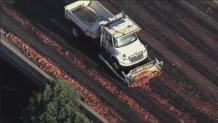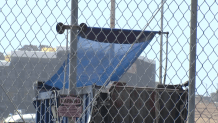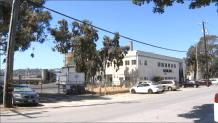The company responsible for spilling raw meat across Interstate 880 in Oakland last month is a Texas-based animal rendering company with a long history of accidentally dumping animal carcasses, blood, and meat parts across U.S. roadways, NBC Bay Area’s Investigative Unit has confirmed through the California Highway Patrol.
The raw poultry parts spilled out from an open-top trailer being hauled by the Texas-based animal rendering company Darling Ingredients, which turns waste animal byproducts into ingredients for pet food, fertilizer, and fuel. The company operates a large plant in San Francisco.
The spill snarled traffic for hours and caused four accidents as motorists spun out on the slippery blanket of meat covering the roadway. Nobody was seriously injured and the investigation into the spill remains ongoing.

Get top local stories in San Diego delivered to you every morning. Sign up for NBC San Diego's News Headlines newsletter.
According to the CHP, the truck’s driver failed to pull over and wait for authorities after his cargo sloshed out onto the highway, a violation of state law.
In a statement, a spokesperson for Darling Ingredients said the company has launched an internal investigation into the incident and is “cooperating with all relevant authorities." However, the spokesperson did not respond to a list of specific questions about the company’s policies or safety record.
As the CHP continues to probe the company’s May spill in Oakland, NBC Bay Area’s Investigative Unit dug into Darling Ingredients’ history, finding a trail of similarly grisly messes the company’s trucks have left in their wake. Headlines from across the country have highlighted recent Darling Ingredients spills in places such as New Jersey, Virginia, and Canada.
Then, there’s the rural agricultural town of Clinton, NC.
Over the past two years, according to Clinton Police Chief Anthony Davis, Darling Ingredients’ trucks have accidentally dumped blood, guts, hog parts, feces, and animal heads onto the city’s roadways.
The city is a frequent pass through for truck drivers making deliveries for Darling Ingredients and its subsidiary companies, such as Valley Proteins. The most recent spill in Clinton occurred just three weeks before the I-880 spill in Oakland, according to the chief.
“I personally think it’s degrading to our community,” Davis said. “Our citizens deserve better.”
Davis said the spills have cost the city at least $36,000 to clean up the mess. There’s also the lingering smell, Davis said.
“The smell is just horrendous,” Davis said. “If you drive through this stuff, you can’t get it off your vehicle.”
Davis said the company often transports animal byproducts in open-top trailers, covered only by tarps. NBC Bay Area observed trucks entering the company’s San Francisco plant with similar setups.

“Whether they’re slamming on the brakes, going around a curve too fast, they’re hauling these byproducts that are mostly liquid in open-top trailers,” Davis said. “So, if they’re hitting the brakes, there’s stuff sloshing around in the back of the trailer. It just comes over the side of the trailers and out on the roadways.”
Davis said Darling needs to improve its hauling practices because the spills keep coming.

The company has been hit with at least 27 violations over the past year by the Federal Motor Carrier Safety Administration for overfilling their trucks, according to federal transportation officials.
Inspectors also noted a dozen “load securement” violations over the past year for Valley Proteins, Darling’s subsidiary company, officials say.
The chief said he wasn’t surprised to hear the driver responsible for the Oakland spill drove off without waiting for authorities. In Clinton, drivers for Darling Ingredients were leaving the scene of animal waste spills so often, Davis said, city officials pushed state lawmakers to pass legislation making it a misdemeanor crime to do so.
While the law has only been in effect since last December, the Chief said two drivers from Darling Ingredients have already been criminally charged since then. In one case, Davis said, they located the offending truck in a neighboring county by “basically following the trail of blood.” Neither driver has entered a plea in court.
“I think it just goes to show that we’re not making any progress,” Davis said. “You don’t see UPS or milk trucks slamming on the breaks and spilling packages or milk all over the highway. We’ve got to find a way to haul these products safely.”
Darling Ingredients did not respond to specific questions about its spills in North Carolina, the criminal charges against its drivers, or the transportation violations noted by inspectors.

